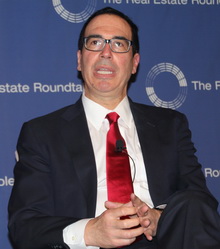The Internal Revenue Service (IRS) and the Department of the Treasury on August 8 released guidance on the new pass-through deduction enacted in last year's tax overhaul bill.
 |
"The pass-through deduction is an important tax cut for small and mid-size businesses, reducing their effective tax rates to their lowest levels since the 1930s," said Treasury Secretary Steven Mnuchin, above. "Pass-through businesses play a critical role in our economy. This 20-percent deduction will lead to more investment in U.S. companies and higher wages for hardworking Americans." |
The 184-page proposed regulation on the deduction will be formally published in a future edition of the Federal Register. Stakeholders and other interested parties will then have 45 days to submit public comments, followed by a public hearing on the proposed regulation on October 16.
The Real Estate Roundtable’s latest quarterly Economic Sentiment Index reported commercial real estate industry executives continue to see balanced and stable market conditions for Q3, despite growing concerns that the market may be at peak pricing and could be nearing the end of its current cycle.
 |
The Roundtable’s Q3 2018 Economic Sentiment Index registered at 52 — a one point increase from the last quarter. However, this quarter’s Future-Conditions Index of 49 is seven points lower than the Current-Conditions index of 56. |
The report’s Topline Findings include:
 |
Roundtable CEO and President Jeffrey DeBoer noted, “Looking to future market conditions, industry executives are noting uncertainties regarding the November midterm elections and growing interest rate and international trade concerns. Policymakers must stay focused on developing pro-growth policies that continue to benefit the overall economy and spur job growth.” |
DeBoer added, “Looking to future market conditions, industry executives are noting uncertainties regarding the November midterm elections and growing interest rate and international trade concerns. Policymakers must stay focused on developing pro-growth policies that continue to benefit the overall economy and spur job growth.”
Data for the Q3 survey was gathered in July by Chicago-based FPL Associates on The Roundtable’s behalf. The next Sentiment Survey covering Q4 2018 will be released in November.